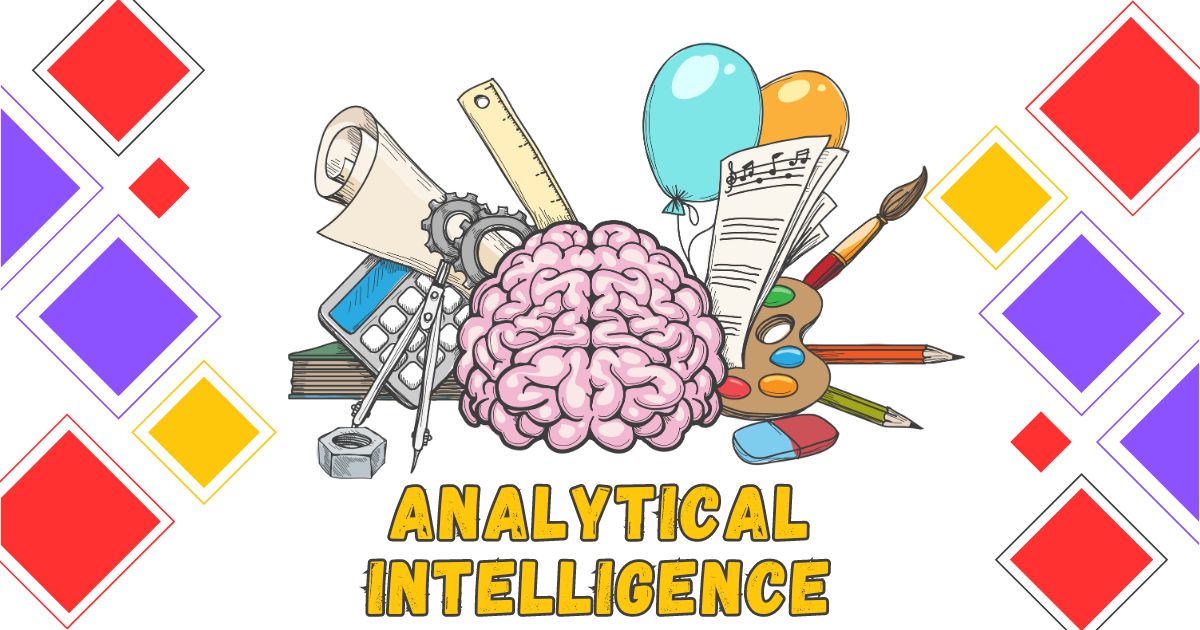In today’s fast-paced world, the ability to think critically and make well-informed decisions is more important than ever. Analytical intelligence, one of the three components of the Triarchic Theory of Intelligence proposed by psychologist Robert Sternberg, is essential for solving problems, analyzing data, and making logical decisions. In this blog post, we’ll explore 5 proven ways analytical intelligence enhances problem-solving and decision-making, the benefits it offers, and how you can improve your own analytical thinking skills for success in both personal and professional life.
What is Analytical Intelligence? A Simple Explanation
This type of intelligence refers to the ability to analyze, evaluate, and reason through information to solve problems, make decisions, and understand complex concepts. It is often associated with logical thinking, critical analysis, and the ability to break down complex problems into manageable parts. Individuals with high analytical intelligence excel in academics, strategic thinking, and tasks that require a high level of concentration and logical reasoning.
Key Aspects of Analytical Intelligence
- Problem-solving: It is essential for identifying the root cause of problems and developing effective solutions.
- Logical reasoning: This form of intelligence involves the ability to follow logical steps and make connections between different pieces of information.
- Evaluation and analysis: People with strong this form of intelligence can critically evaluate data, weigh pros and cons, and draw well-reasoned conclusions.
In many cases, it is what allows individuals to excel in fields such as mathematics, science, engineering, and finance, where logical analysis and problem-solving are crucial.
The Role of Analytical Intelligence in Problem-Solving
One of the primary benefits of analytical intelligence is its role in problem-solving.Individuals with high cognitive abilities can break down complex issues, think logically about the different components, and identify practical solutions. Here’s how this type of intelligence supports problem-solving:
1. Breaking Down Complex Problems
People with strong analytical intelligence excel at breaking down large, complicated problems into smaller, more manageable components. This method of simplifying problems allows for a step-by-step approach to problem-solving, ensuring that each part of the issue is addressed thoroughly.
2. Analyzing Data and Information
This type of intelligence involves the ability to evaluate data and information critically. Whether it’s interpreting statistical data or understanding the underlying factors in a social issue, people with strong cognitive abilities know how to analyze the facts before coming to a conclusion.
3. Logical Approach to Solutions
Once the problem is broken down, individuals with strong analytical skills use logical reasoning to come up with potential solutions. They consider all aspects of the issue, weigh the options, and choose the solution that is most likely to achieve the desired outcome.
4. Identifying Patterns
Analytical thinkers are skilled at identifying patterns in information. Whether it’s recognizing trends in financial markets or identifying recurring issues in business operations, their ability to spot patterns helps them make better decisions and predictions.
5. Evaluating Multiple Solutions
People with this form of intelligence tend to look at problems from different perspectives and consider multiple solutions. They critically assess the strengths and weaknesses of each option before making a final decision, ensuring that the best course of action is chosen.
How Analytical Intelligence Differs from Practical Intelligence
While analytical skills focus on solving theoretical and logical problems, practical intelligence deals with real-world, everyday situations. Understanding the distinction between the two is important, as they serve different purposes but can complement each other.
Analytical Intelligence
- Theoretical and logical thinking: It is concerned with abstract reasoning, solving puzzles, and understanding complex concepts.
- Focus on logic: It involves using logic and reasoning to solve problems in a structured manner.
- Ideal for academic settings: It is often associated with high performance in academic tests, such as IQ tests and standardized exams.
Practical Intelligence
- Real-world problem-solving: Practical intelligence, on the other hand, is the ability to solve everyday problems and navigate social environments.
- Street smarts: It involves using common sense, experience, and contextual knowledge to find solutions to problems in real-life scenarios.
- Adaptability: Practical intelligence helps individuals adapt to changing environments and handle challenges that arise in day-to-day life.
While analytical skills is valuable for solving abstract problems, practical intelligence is crucial for dealing with real-world situations. Together, they form a well-rounded set of skills that can help individuals excel in both personal and professional environments.
Real-Life Applications of Analytical Intelligence
This type of intelligence is not just useful for academic pursuits—it has countless real-life applications in a variety of fields. Here are some examples of how it can be applied in different settings:
1. Business and Finance
In the world of business and finance, this type of intelligence plays a key role in data analysis, market predictions, and strategic planning. Business leaders rely on it to evaluate market trends, analyze financial data, and make decisions that ensure the long-term success of their companies.
2. Science and Research
Scientists and researchers use analytical intelligence to design experiments, interpret results, and make groundbreaking discoveries. The ability to analyze data critically and draw logical conclusions is crucial in fields like biology, physics, and chemistry.
3. Education
Teachers and educators often use analytical intelligence to evaluate their students’ performance, identify areas for improvement, and develop effective teaching strategies. Additionally, students with strong analytical skills tend to excel in subjects like mathematics and science, where logical reasoning is essential.
4. Legal and Judicial Fields
In legal professions, this type of intelligence is vital for evaluating evidence, understanding legal precedents, and constructing persuasive arguments. Lawyers and judges rely on their analytical skills to interpret the law, examine the facts of a case, and deliver fair judgments.
How to Improve Analytical Intelligence: 5 Effective Strategies
While some people may have a natural aptitude for analytical thinking, it is a skill that can be developed and improved over time. Here are 5 effective strategies for enhancing your analytical intelligence:
1. Solve Puzzles and Brain Teasers
Engaging in activities like puzzles, brain teasers, and logic games can help improve your critical thinking and problem-solving abilities. These activities challenge your brain to think in new ways and enhance your capacity for analytical reasoning.
2. Read More
Reading regularly, especially books and articles that challenge your thinking, can improve your ability to analyze information and understand complex ideas. Focus on subjects that require critical thinking, such as philosophy, science, and economics.
3. Practice Problem-Solving
Look for opportunities to solve problems in your daily life. Whether it’s managing a project at work or resolving a personal challenge, the more you practice problem-solving, the better your analytical intelligence will become.
4. Engage in Critical Thinking Exercises
Participating in critical thinking exercises, such as debates or group discussions, helps improve your ability to evaluate arguments, consider multiple perspectives, and draw logical conclusions. These exercises stimulate your mind and improve your reasoning skills.
5. Take Analytical Courses
If you’re serious about improving your analytical intelligence, consider taking courses in math, science, or logic. These subjects provide structured opportunities to develop your analytical thinking skills, and the lessons learned can be applied to various areas of life.
The Importance of Analytical Intelligence in Decision Making
Effective decision making relies heavily on analytical intelligence, as it involves evaluating multiple options, weighing the pros and cons, and determining the best course of action. Here are some reasons why analytical skills is crucial in decision-making processes:
1. Logical Approach to Decision Making
Individuals with high analytical skills are able to make logical and well-reasoned decisions based on facts and data. Rather than relying on gut feelings or emotions, they critically assess the situation and come to a decision that is both rational and well-informed.
2. Avoiding Bias
This form of intelligence helps people recognize and avoid cognitive biases that can cloud judgment. By focusing on evidence and logical reasoning, individuals can make decisions that are objective and free from emotional influence.
3. Better Risk Assessment
When making important decisions, it’s crucial to assess the risks and potential outcomes. Analytical intelligence enables individuals to consider all possible scenarios, weigh the potential risks, and choose the option that minimizes risk while maximizing potential rewards.
Examples of Analytical Intelligence in Everyday Life
To better understand how analytical intelligence works, let’s look at a few examples from everyday life:
1. Planning a Budget
Imagine you’re planning a monthly budget for your household. You need to analyze your income, expenses, and savings goals. By using your analytical skills, you break down each category, evaluate where to cut costs, and plan a budget that meets your financial needs without overspending.
2. Diagnosing a Problem with a Device
Suppose your laptop stops working, and you need to figure out why. Instead of immediately panicking, you use your analytical intelligence to diagnose the problem step by step. You check the battery, power cables, and settings systematically until you find the root cause of the issue and fix it.
3. Evaluating Career Opportunities
When deciding between two job offers, this form of intelligence helps you weigh the pros and cons of each position. You analyze factors such as salary, benefits, work-life balance, and potential for growth to make an informed decision that aligns with your career goals.
Conclusion: Why Analytical Intelligence is Key to Success
Analytical intelligence is a critical skill for success in both personal and professional life. It allows individuals to think logically, solve problems, and make well-informed decisions that lead to better outcomes. By developing your analytical-intelligence, you can enhance your ability to navigate complex challenges, think critically about important decisions, and improve your problem-solving capabilities. With the right strategies and mindset, anyone can strengthen their analytical intelligence and achieve greater success in their endeavors.
FAQs About Analytical Intelligence
- What is analytical intelligence?
Analytical intelligence refers to the ability to analyze, evaluate, and reason through information to solve problems and make decisions. - How is analytical intelligence different from practical intelligence?
Analytical intelligence focuses on logical problem-solving, while practical intelligence deals with real-world challenges using experience and common sense. Enhance your problem-solving abilities by exploring the essential benefits of practical intelligence. Check out the 5 Key Benefits of Developing Practical Intelligence for Real-World Success here. - Can analytical intelligence be improved?
Yes, analytical intelligence can be developed through critical thinking exercises, puzzles, reading, and problem-solving practice. - What are some examples of analytical intelligence?
Examples include planning a household budget, diagnosing technical problems, and making decisions based on data analysis. - Why is analytical intelligence important in decision making?
Analytical intelligence helps individuals evaluate options logically, avoid bias, and make informed decisions based on evidence. - How does analytical intelligence help in problem-solving?
It allows individuals to break down complex problems, analyze data, and identify logical solutions. - What are some strategies to improve analytical intelligence?
Solving puzzles, reading challenging books, engaging in critical thinking exercises, and taking courses in logic or math can help. - How does analytical intelligence impact business success?
Business leaders with strong analytical intelligence can make data-driven decisions, assess risks, and develop strategic plans. - Is analytical intelligence more important than emotional intelligence?
Both forms of intelligence are important, but analytical intelligence is key to logical problem-solving, while emotional intelligence is vital for managing relationships and emotions. - Can analytical intelligence be applied in everyday life?
Yes, analytical intelligence is useful in everyday scenarios such as managing finances, solving technical problems, and making career decisions.

Joseph Bush is a seasoned writer and researcher with over 7 years of experience covering a wide range of general topics, from lifestyle and technology to business and current events. He is dedicated to producing fact-checked, reader-friendly content that informs, engages, and empowers readers.
Throughout his career, Joseph has followed strict editorial guidelines, relied on reputable sources, and ensured every article meets the highest standards of accuracy and clarity. His expertise spans multiple fields, allowing him to explain complex topics in a way that’s easy to understand.
Passionate about continuous learning, Joseph stays updated on industry trends and best practices to deliver trustworthy, well-rounded insights. Readers can rely on his work for its credibility, depth, and real-world relevance.




